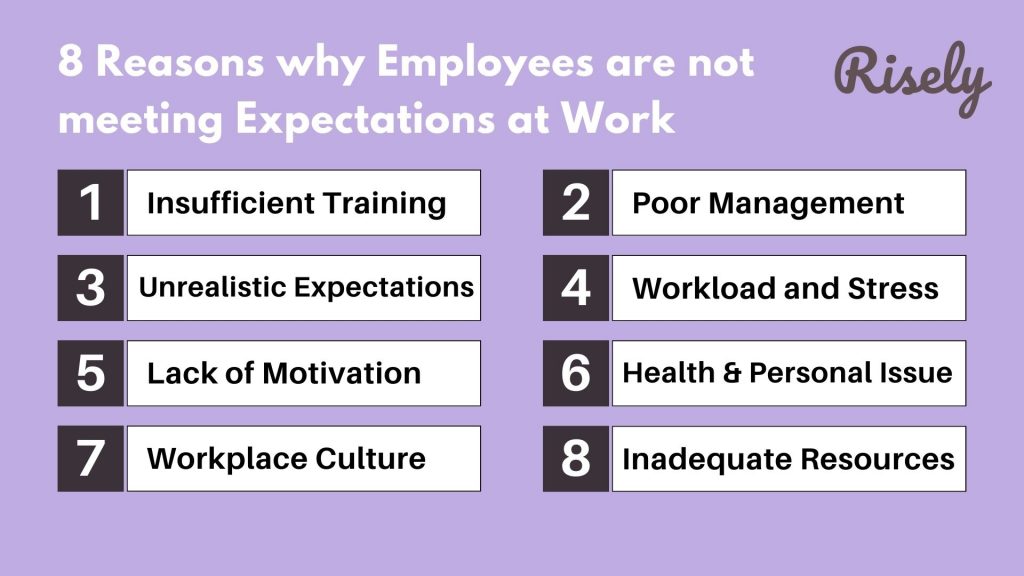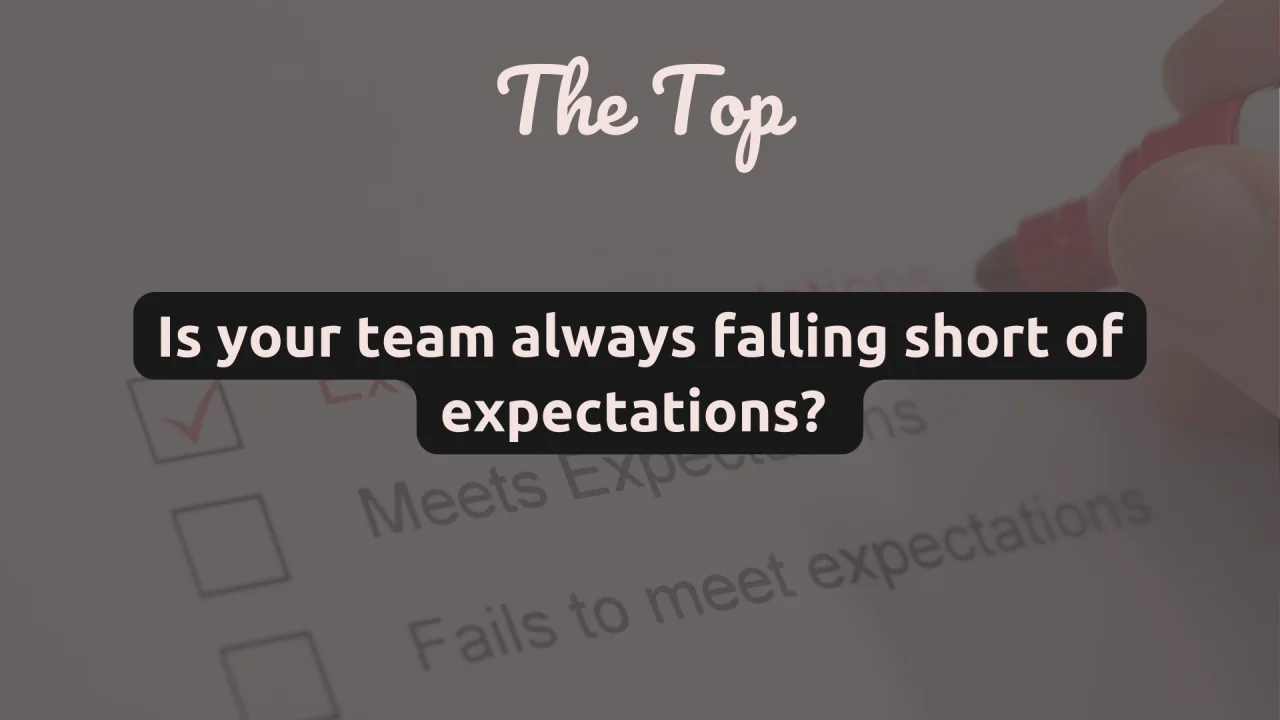17 Things to do When Your Team is Not Meeting Expectations
As a manager, it can be frustrating when team members don’t meet expectations. It’s essential to address this issue constructively, which helps the employee improve and ultimately benefits the team. This blog will discuss what it means when team members are not meeting expectations and how it can impact your team. Next, we’ll cover tips on how to have difficult conversations with employees about their performance, including conducting a performance review. Lastly, we’ll dive into ways you can handle underperformance by developing an action plan, providing support and resources, and ensuring accountability through follow-up. Join us as we explore how to manage team members who are not meeting expectations.Understanding Unmet Expectations
Examples of Not Meeting Expectations at Work
Not meeting expectations can project itself in any way. Knowing them is very helpful in objectively assessing your team members and employees. Here are some examples of not meeting expectations at work to help you understand what it looks like in the behaviors of your employees; –- Poor Attendance or Punctuality: If an employee regularly comes in late, leaves early, or misses work without proper notice, they are not meeting the expectations of their manager.
- Low Productivity: An employee who consistently fails to complete assigned tasks within the required timeframe or produces low-quality work may be considered not meeting expectations.
- Lack of Accountability: Employees who frequently fail to take responsibility for their actions or blame others for their mistakes are not meeting expectations.
- Poor Interpersonal Skills: If employees cannot work well with others or communicate poorly, they may not meet expectations.
- Failure to Meet Goals: Employees who consistently fail to achieve their performance goals may not be meeting expectations.
Other Interesting Reads
Impact of Not Meeting Expectations at Work
Not meeting expectations by an employee can not only impact that person’s work life but also significantly impact the team and organization. Here are some potential effects:- Reduced Productivity: When an employee is not meeting expectations, it can slow down the team’s work and make them miss deadlines, resulting in reduced productivity and efficiency.
- Decreased Morale: When one team member is not meeting expectations, it can create a negative atmosphere and lower morale for the entire team.
- Poor Quality of Work: If an employee is not meeting expectations in terms of quality, it can lead to a decrease in the overall quality of work produced by the team.
- Increased Costs: If an employee is not meeting expectations, it can increase costs to the organization, such as additional training or hiring a replacement.
- Loss of Reputation: If clients or customers notice an employee’s poor performance, it can damage the organization’s reputation.
- Delayed Deadlines: If an employee is not meeting expectations in terms of productivity or quality, it can delay projects and result in missed deadlines.
- Reduced Trust: If an employee is not meeting accountability or interpersonal skills expectations, it can lead to frustration and loss of trust between team members, which may ultimately result in lowered morale.

8 Reasons why Employees are not meeting Expectations at Work
8 reasons why employees are not meeting expectations at work are as follows:- Insufficient Training: Inadequate training or a lack of access to resources needed for the job can hinder employees’ ability to meet expectations. They may not have the necessary skills or knowledge to excel in their roles.
- Poor Management: Managers are critical in setting expectations and providing support. Ineffective management, such as inconsistent feedback, micromanagement, or lack of recognition, can demotivate employees and impact their performance.
- Unrealistic Expectations: Setting overly ambitious or unrealistic goals can frustrate employees. When expectations are not aligned with available resources and time, employees may struggle to meet them.
- Workload and Stress: Excessive workloads and high-stress levels can negatively affect performance. When employees are overwhelmed, they might make mistakes or miss deadlines, leading to lower productivity.
- Lack of Motivation: Employees who lack motivation may not try to meet expectations. Various factors, including job satisfaction, recognition, and alignment with personal goals, can influence motivation.
- Health and Personal Issues: Sometimes, personal problems or health issues can affect an employee’s ability to perform optimally. Employers need to provide support and accommodations when necessary.
- Workplace Culture: An unsupportive or toxic workplace culture can be a significant barrier to meeting expectations. When employees do not feel valued or respected, their performance may suffer.
- Inadequate Resources: Insufficient access to tools, technology, or materials required for the job can hinder an employee’s performance. Lack of resources can lead to frustration and inefficiency.
How to tell an employee they are not meeting expectations? Examples
As a manager, you would have encountered a situation where your team members face performance issues that often impact the whole team. But these situations also put managers into quite a dilemma about handling such employees. Therefore, thinking about how you approach a team member with performance issues is essential, as these conversations can quickly go wrong. We will now take you through two scenarios where you, as a manager, would have to deal with or talk about performance issues with employees and provide some tips that would be useful in having a constructive conversation about a complex topic.With a New Employee is Not Meeting Expectations
Remember that every employee is unique, and each situation requires a different approach. Here are some tips for managers on how to handle a new employee not meeting expectations:- Provide clear expectations: Make sure the employee knows what is expected of them regarding job duties, performance standards, and company culture from the beginning. Expectation setting is one of the major functions for a manager.
- Set specific goals: Work with the employee to set clear and achievable goals to help them succeed.
- Offer training and support: Provide training and support to help employees improve their skills and knowledge. This could include on-the-job training, mentoring, coaching, or additional resources.
- Provide feedback: Give the employee regular feedback on their positive and constructive performance. This will help them understand where to improve and what they are doing well. Check out some examples of feedback here to use: 30 Constructive Feedback Examples For Every Day Workplace Matters
- Be patient: It takes time for a new employee to adjust to a new role and company culture fully. Give the employee time to adapt and learn.
- Communicate clearly: Be honest and transparent when discussing the employee’s performance issues and be empathetic and respectful. Remember that feedback should be constructive, not punitive.
- Consider reassignment: If the employee is not meeting expectations despite your best efforts to support them, consider reassigning them to a role that fits their skills and strengths better.
- Follow up: After the meeting, follow up with the team member to see how they are doing and provide any necessary support or guidance.
Discussion on not meeting expectations in performance review
Performance reviews are one of the most effective ways for managers to assess whether an employee is meeting expectations. These reviews offer an opportunity to provide feedback on both positive and negative behaviors. Performance reviews can also be instrumental in career development by guiding how to enhance their skills and capabilities further. Here are some tips for managers on how to conduct a performance review when an employee is not meeting expectations:- Provide specific examples: During the performance review, provide specific examples of the areas where the employee is not meeting expectations. This will help the employee understand what they need to improve and what actions they can take.
- Focus on the behavior: When discussing the areas of improvement, focus on the behavior rather than the person. Be objective and avoid making personal attacks or criticisms.
- Set clear goals: During the performance review, set clear goals for the employee to work towards. Ensure the goals are specific, measurable, achievable, relevant, and time-bound (SMART).
- Provide support and resources: Offer the employee support and resources to help them improve their performance. This may include additional training, coaching, or mentoring.
- Be open to feedback: Ask the employee for feedback on how you can better support them and help them improve their performance. This will show that you value their opinion and are open to feedback. Ask open-ended questions to know more about your team.
- Follow up: After the performance review, follow up with the employee regularly to see how they are doing and provide any necessary support or guidance. Make sure to acknowledge any improvements they have made and provide positive feedback.
- Document everything: Make sure to document the performance review, including the areas of improvement, goals set, and any action plans agreed upon. This will help ensure accountability and provide a reference for future performance reviews.
Some Other General Tips for Managers while talking to employee not meeting expectations
- Be prepared: Before the meeting, make sure you have all the necessary information, such as performance data, examples of specific incidents, and documentation, so that you can have a productive conversation with the employee.
- Choose the right time and place: The meeting should be private, where employees feel comfortable and free to express themselves. The timing of the meeting should also be well-considered so that it does not interfere with other essential activities or sessions.
- Start with the positives: Acknowledge the employee’s contributions to the organization. This will help set the tone for the rest of the conversation. You can try a feedback sandwich approach to cover all the aspects of their performance.
- Be specific: Provide specific examples of the performance issues you have observed. This will help the employee understand what they need to improve on.
- Listen actively: Listen to the employee’s perspective and ask questions to understand their point of view. This will show that you value their opinion and are open to feedback. Prepare some active listening questions to get this right.
- Focus on solutions: Work with the employee to identify solutions to the performance issues. This will help the employee feel empowered and motivated to make a change.
Conclusion
Not meeting expectations at work can be difficult for both the employee and the manager. However, addressing these issues as soon as possible is essential before they become an even bigger problem. It is crucial to approach the conversation with empathy and understanding but also with a clear plan of action. As a manager, you must provide support, resources, and accountability to help your team members improve their performance.Test your expectation setting skills for free in just a few minutes!
Understand the ins-and-outs of your skills to develop proficient managerial skills.
Frequently Asked Questions
How do you say “not meeting expectations” to a team member?
To express that expectations are not being met, it’s essential to be clear and specific about the areas where improvement is needed. Using “I” statements can help express concerns in a non-confrontational way, such as “I have noticed that…” or “I am concerned about…”. Providing constructive feedback and suggestions for improvement can help the individual understand what they need to work on. Following up regularly to track progress and provide support if required can also help ensure that expectations are met in the future.
What to do when an employee is not meeting expectations?
When an employee is not meeting expectations, it is essential to ensure clear expectations are set from the beginning and that communication has been regular. Identify the reasons behind their performance issues and provide specific feedback on areas for improvement. Develop an action plan with measurable goals and deadlines to help employees meet expectations. Additional training or resources to support their success may also be helpful. The employee can improve their performance and meet expectations with patience and guidance.
How do you answer expectations as a manager?
As a manager, you must set clear expectations for your team and ensure everyone understands their expectations. This includes setting goals, providing feedback, and holding employees accountable. Additionally, it is vital to lead by example and model the behavior and work ethic that you expect from your team. Finally, effective communication, consistent follow-through, and a willingness to adapt and make changes as needed are also crucial to meeting expectations as a manager.
Other Related Blogs
Is your team always falling short of expectations?
Is your team always falling short of expectations? Hey there, manager! If you’ve been here for a while, you’d know that expectation setting is one of the core areas a…
7 Gen Z Workplace Expectations From A Manager
7 Gen Z Workplace Expectations From A Manager More and more members of Generation Z (Gen Z) are entering the workforce every year, and they are already challenging traditional workplace…
5 Great Expectation Setting Tricks Every Manager Needs
5 Great Expectation Setting Tricks Every Manager Needs As a leader, setting expectations at work is crucial to ensure that your team is aligned toward achieving common goals. But with…
5 Creative Expectation Setting Activity For All Managers
5 Creative Expectation Setting Activity For All Managers As a manager, it’s essential to set clear expectations with your team to ensure everyone is on the same page and working…


